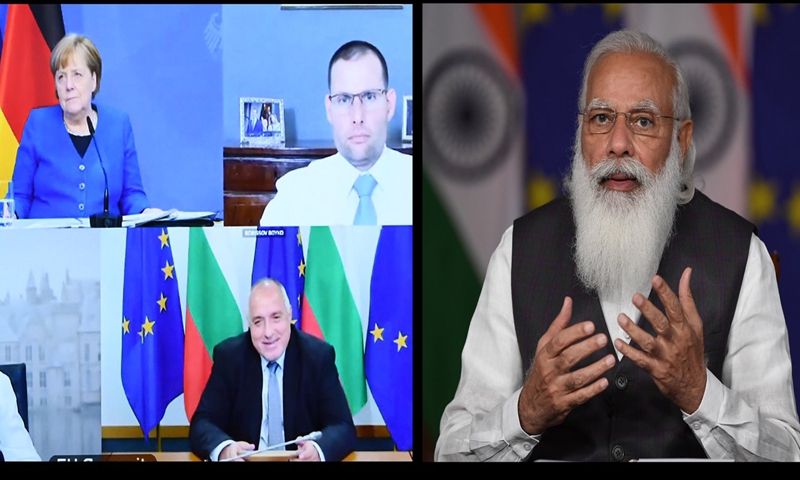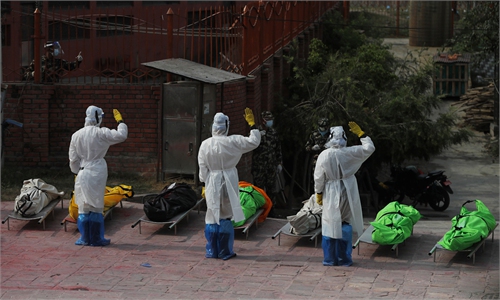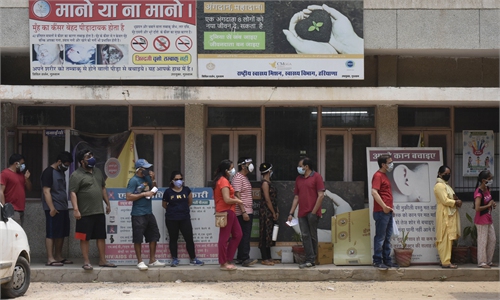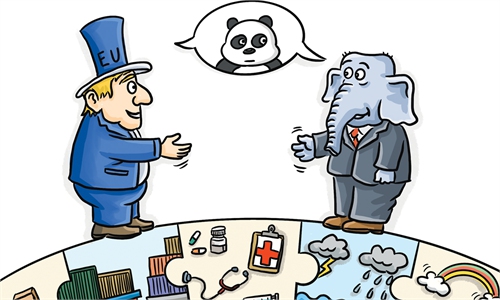India put on table by EU as 'backup plan' for trade; sidelining China only 'wishful thinking'
Disputes between India and Europe prevail on issues like rising protectionism, vaccine waiver

Indian Prime Minister Narendra Modi and the heads of state or government of member states of the EU meet on a virtual summit on Saturday. Photo: @MEAIndia
When some Indian and European officials hailed the resumption of trade talks and an agreement on enhanced partnership to seek replacement of China amid growing opposition toward the China-Europe investment deal, some Chinese observers consider that sidelining China through an EU-India tie-up is wishful thinking, as disputes between India and Europe such as prevailing protectionism in India and different attitudes on a US-proposed vaccine waiver plan will hinder talks.
The EU and India reached agreement on Saturday following a virtual meeting between Indian Prime Minister Narendra Modi and European officials including European Council President Charles Michel and President of the European Commission Ursula von der Leyen, pledging to invest in EU-India Strategic Partnership, work together on global climate change and on fighting the COVID-19 pandemic while resuming negotiations on an EU-India trade agreement, according to an announcement published on the website of the European Council. It is a significant move, according to Indian media, as it was the first high-level interaction between India and the EU on this issue since free trade talks stalled eight years ago.
Some European officials like Michel and Von der Leyen praised the progress in EU-India relationship by calling it as "opening a new chapter for strategic partnership," and said the virtual meeting was a "milestone." Besides the resumption of trade talks, the two sides will launch parallel negotiations on an EU-India investment protection agreement and on geographic indications.
However, it is becoming crystal clear to Western media and experts that such interaction between India and Europe shares another goal: to sideline or confront China, particularly when the China-Europe relationship has been souring due to growing tensions after the EU took a harsh stance on China's Xinjiang-related issues, which also apparently weighed on ratifying the China-EU investment deal.
Lawmakers in the EU are planning to introduce a motion this month that would effectively ban any debate on the Comprehensive Agreement on Investment (CAI) until the Chinese government removes its sanctions on EU lawmakers and scholars, after the deal had already been put in the freezer by the European Parliament's trade committee.
"The recent countermeasures that China took toward the EU and Australia worried Europe, leading it to consider a backup plan for the China-EU deal, so India has been put on the table to replace China as the world's factory," Wang Yiwei, Jean Monnet chair professor and director of the Center for EU Studies at the Renmin University of China, told the Global Times on Sunday.
In order to cultivate India as a potential competitor to China, the EU is eyeing a partnership with India in two major sectors - green development and digital transformation on which Europe has been working closely with China, aiming to amplify both European values and the rivalry between China and India, Wang noted.
In addition to the resumption of trade talks, other key outcomes of the India-EU leaders meeting include a new working group on supply chain resilience, dedicated dialogue on WTO issues, regulatory cooperation and market access, and cooperation on high-performance computing and infrastructure investment, according to a summarized note shared by Arindam Bagchi, spokesperson of the Ministry of External Affairs of India.
Some Chinese experts raised doubts over whether the resumption of Europe-India trade talks could effectively lead to any concrete results, as given the severe pandemic situation that is heavily affecting economic recovery, it will be difficult to realize a large-scale renewal of trade activities.
"That India and Europe restarted trade talks amid a souring China-EU relationship indicates a desire to counterbalance China, though the two sides hope for economic recovery through enhanced partnership," Tian Guangqiang, assistant research fellow with the National Institute of International Strategy at the Chinese Academy of Social Sciences, told the Global Times on Sunday.
The current stepped-up partnership signals it is more a political stance than a rush to make a deal, Tian said, as India and Europe are experiencing sluggish economic recoveries and rising protectionism, which will challenge a concrete deal. He noted there are divergences between the two sides on a number of issues which may cast shadows over a deal.
For instance, after the Biden administration said the US supported the temporary waiving of intellectual property rights to COVID-19 vaccines as proposed by India and South Africa at the WTO, some European leaders voiced different views. German Chancellor Angela Merkel weighed in against the US support for patent waivers as a government spokesperson said Thursday that it would create "severe complications" for the production of vaccines, according to media reports.
"It may be a very long and slow process for India and Europe to reach any concrete deal," Tian said.
Apparently, Europe has been playing a similar card of "human rights and shared democratic values" as the Biden administration has in attempting to counter the rise of China by emphasizing that Europe and India are striving for "a safer, prosperous and more democratic world" in their joint announcement on Saturday. But Chinese experts consider that forming an alliance of so-called shared values to confront China is unrealistic, as Europe and the US need to work with China in a pragmatic manner on many multilateral agendas, including climate change and WTO reform.
"It's wishful thinking for Europe and India to push forward such an alliance of values and it's ultimately unlikely to replace China," Wang said.




